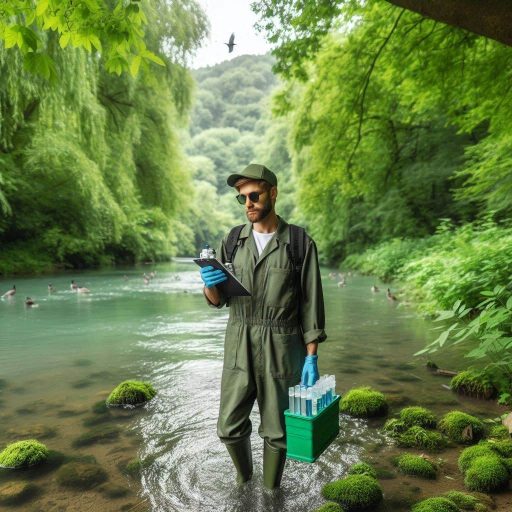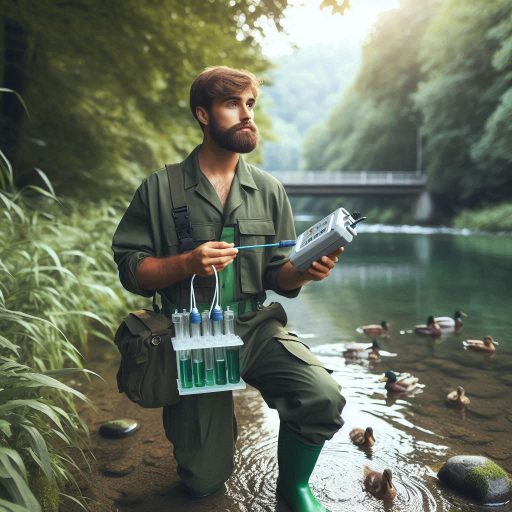Introduction
Environmental technicians are essential in protecting and preserving our environment by monitoring and managing pollutants.
They ensure that industrial activities comply with environmental regulations, safeguarding natural resources and public health.
These professionals analyze air, water, and soil samples to detect contaminants, helping prevent environmental degradation and health hazards.
The importance of environmental technicians has grown as industries expand and environmental challenges increase.
Their work is crucial in preventing pollution, mitigating climate change, and ensuring sustainable practices.
By identifying sources of contamination, they help industries reduce their environmental impact and promote ecological balance.
As awareness of environmental issues rises, the demand for specialized environmental technicians is rapidly increasing.
Industries such as manufacturing, energy, and construction require experts to manage hazardous waste, air quality, and water treatment.
These specializations are vital in addressing specific environmental challenges and ensuring compliance with ever-stricter regulations.
Specialized environmental technicians are also needed in emerging fields like renewable energy, where they monitor the environmental impacts of new technologies.
Their expertise is crucial in ensuring that green technologies are truly sustainable and do not harm ecosystems.
With the growing focus on sustainability, industries are investing in specialized environmental technicians to enhance their environmental performance.
Air Quality Specialist
Air quality specialists are environmental technicians who focus on monitoring and improving air quality.
They play a critical role in ensuring that the air we breathe is safe and healthy.
Their work directly impacts public health, environmental protection, and compliance with regulations.
Responsibilities and Duties of an Air Quality Specialist
Air quality specialists are responsible for monitoring air pollution levels.
They use sophisticated equipment to measure pollutants like carbon monoxide, nitrogen dioxide, and particulate matter.
These measurements help identify areas where air quality is poor or deteriorating.
They conduct air sampling in various environments, including industrial sites, urban areas, and rural regions.
The collected data is analyzed to assess pollution levels and sources.
Air quality specialists are also tasked with identifying emission sources, such as factories, vehicles, and power plants.
By pinpointing these sources, they can recommend strategies to reduce emissions.
Additionally, air quality specialists prepare detailed reports on their findings.
These reports are crucial for regulatory agencies, businesses, and the public.
They provide insights into pollution trends and suggest actions to improve air quality.
Another key responsibility involves advising on and implementing air quality improvement measures.
Air quality specialists work closely with government agencies, industries, and environmental organizations.
They help design and enforce regulations to limit air pollution.
Their expertise is essential for developing policies that protect public health and the environment.
Importance of Monitoring and Improving Air Quality
Monitoring and improving air quality is vital for protecting public health and the environment.
Poor air quality contributes to respiratory and cardiovascular diseases.
It can exacerbate conditions like asthma and bronchitis.
By monitoring air quality, specialists can identify pollution hotspots and take action before these issues worsen.
Improving air quality also helps combat climate change.
Air pollutants like carbon dioxide and methane are greenhouse gases.
Reducing these emissions mitigates global warming and its associated impacts.
Air quality monitoring is also crucial for protecting ecosystems.
Polluted air can harm plants, animals, and water bodies.
For example, acid rain caused by air pollutants can damage forests and lakes.
Air quality specialists play a key role in preventing such environmental damage.
Additionally, ensuring good air quality supports economic growth.
Cleaner air attracts businesses, residents, and tourists.
It also reduces healthcare costs associated with pollution-related illnesses.
Thus, the work of air quality specialists contributes to both environmental sustainability and economic well-being.
Skills and Certifications Needed to Specialize in Air Quality
Becoming an air quality specialist requires a strong background in environmental science or a related field.
Proficiency in using air monitoring equipment and data analysis software is essential.
Specialists must also understand environmental regulations and standards.
Certifications enhance an air quality specialist’s credentials.
Common certifications include Certified Air Quality Professional (CAQP) and certifications from organizations like the American Association for Aerosol Research (AAAR).
These certifications demonstrate expertise and commitment to the field.
Strong analytical skills, attention to detail, and the ability to communicate findings effectively are also crucial.
Specialists must interpret complex data and convey their findings to diverse audiences.
Additionally, problem-solving skills are essential for developing effective air quality improvement strategies.
Read: Top CAD Software for Aspiring CAD Technicians
Water Quality Technician
The role of water quality technicians is crucial in ensuring safe and clean water sources for communities and ecosystems.
These technicians use different techniques and tools to conduct water quality testing, such as pH meters, turbidity meters, and chemical testing kits.
By analyzing water samples, they can detect contaminants, pollutants, and other harmful substances that may pose risks to human health and the environment.
Water quality technicians play a key role in monitoring and maintaining the quality of drinking water, recreational water bodies, and industrial wastewater.
Role of Water Quality Technicians
- Conduct regular water sampling and testing to assess water quality.
- Utilize advanced equipment and tools to analyze various water parameters.
- Interpret test results and identify potential sources of contamination.
- Collaborate with other environmental professionals to develop water quality management plans.
Techniques and Tools Used in Water Quality Testing
- Physical testing methods like temperature and turbidity measurements.
- Chemical analysis techniques including titration and spectrophotometry.
- Biological indicators such as bacteria and algae monitoring.
- Remote sensing technologies for assessing water quality from a distance.
Career Opportunities and Growth Potential
Water quality technicians can find employment in various sectors including government agencies, consulting firms, water treatment plants, and environmental organizations.
With experience and additional certifications, technicians can advance to supervisory roles, water quality management positions, or specialized areas like groundwater monitoring.
There is a growing demand for skilled water quality technicians due to increasing concerns about water pollution, climate change, and the need for sustainable water management practices.
Overall, a career as a water quality technician offers opportunities for professional development, job stability, and the chance to make a positive impact on public health and the environment.
Read: Surveying and Mapping Technician Internships: A Guide
Hazardous Materials Manager
Working as a hazardous materials manager involves overseeing the safe handling and disposal of dangerous substances.
Overview of Hazardous Materials Management
Overview of Hazardous Materials Management and the Role of Technicians
Hazardous materials management is crucial in protecting public health and the environment.
Environmental technicians specialize in managing these dangerous substances.
They oversee the entire lifecycle of hazardous materials, from acquisition to disposal.
Technicians ensure that hazardous materials are handled safely to prevent accidents and environmental contamination.
Their role involves conducting regular inspections and audits.
They monitor compliance with safety regulations and standards.
Technicians also develop and implement procedures for safe handling and disposal.
Their responsibilities include identifying potential hazards and mitigating risks associated with hazardous materials.
Proper management helps prevent spills, leaks, and other incidents that could harm people and the environment.
Importance of Proper Handling and Disposal of Hazardous Materials
Proper handling and disposal of hazardous materials are vital to preventing environmental and health risks.
Incorrect handling can lead to dangerous chemical reactions or environmental contamination.
For instance, improper disposal of toxic waste can pollute soil and water sources.
This contamination can have long-term effects on ecosystems and public health.
Environmental technicians play a key role in ensuring proper disposal methods.
They ensure that hazardous materials are stored in suitable containers and areas.
Technicians follow strict protocols for waste segregation and treatment.
They also manage the transportation of hazardous materials to disposal facilities.
Their attention to detail helps minimize the risks associated with hazardous materials and protects communities.
Required Training and Certifications for Hazardous Materials Managers
To effectively manage hazardous materials, technicians require specialized training and certifications.
This training equips them with knowledge about safety protocols and regulatory requirements.
Certification programs often cover topics such as hazardous waste operations, emergency response, and chemical safety.
Key certifications include the Hazardous Materials Management Certification (HMMC) and the Certified Hazardous Materials Manager (CHMM) credential.
These certifications demonstrate a technician’s expertise and commitment to safe practices.
Training programs also include hands-on experience with hazardous materials and emergency response procedures.
Ongoing education is essential for staying current with regulations and advancements in hazardous materials management.
Read: Impact of Drones on Surveying and Mapping

Sustainability Coordinator
Responsibilities of a Sustainability Coordinator in Promoting Environmentally Friendly Practices
Sustainability coordinators are essential in guiding organizations toward greener practices and reducing their environmental impact.
They develop and implement strategies to enhance sustainability across operations.
Their primary responsibility is to conduct environmental audits to assess current practices and identify areas for improvement.
Coordinators also create and manage programs that promote energy efficiency, waste reduction, and sustainable resource use.
Education is a key part of their role.
They train staff on best practices for sustainability, ensuring that everyone understands their role in achieving environmental goals.
Coordinators also work to integrate sustainability into company policies and procedures.
They monitor and report on progress, providing data and recommendations for further improvements.
Collaborating with other departments, sustainability coordinators ensure that all aspects of the organization align with environmental goals.
They stay updated on regulatory requirements and industry trends, ensuring compliance and adapting strategies as needed.
Building relationships with external stakeholders, including suppliers and community organizations, helps in advancing broader sustainability initiatives.
Projects and Initiatives That Sustainability Coordinators Lead
Sustainability coordinators spearhead a variety of projects aimed at reducing environmental footprints.
One common initiative is the implementation of recycling programs, which involves setting up systems for efficient waste sorting and disposal.
Coordinators also lead energy audits and work on projects to reduce energy consumption, such as upgrading to energy-efficient lighting and HVAC systems.
Water conservation projects are another focus.
Coordinators may design and implement systems to reduce water use and promote conservation practices.
They also oversee the development of green building projects, ensuring that new constructions meet sustainability standards and utilize eco-friendly materials.
Community outreach and educational programs are vital projects that coordinators manage.
These initiatives aim to raise awareness about environmental issues and encourage sustainable practices among the public.
Coordinators may also lead efforts to obtain green certifications for their organizations, such as LEED (Leadership in Energy and Environmental Design) certification.
Transform Your Career Today
Unlock a personalized career strategy that drives real results. Get tailored advice and a roadmap designed just for you.
Start NowSkills and Qualifications Needed to Specialize in Sustainability Coordination
Specializing in sustainability coordination requires a unique set of skills and qualifications.
A strong background in environmental science or a related field is essential, providing the technical knowledge needed to develop effective sustainability strategies.
A bachelor’s degree in environmental science, sustainability, or a related discipline is typically required, though advanced degrees may offer an advantage.
Key skills include project management, as coordinators must oversee multiple initiatives simultaneously.
Excellent communication and interpersonal skills are crucial for educating staff, collaborating with departments, and engaging with external stakeholders.
Analytical skills are also important for conducting audits, analyzing data, and measuring the impact of sustainability initiatives.
Certifications, such as the Certified Sustainability Professional (CSP) or Leadership in Energy and Environmental Design (LEED) accreditation, can enhance qualifications and demonstrate expertise.
Staying informed about industry trends and regulatory changes is also crucial for continued success in this field.
Read: Safety Tips for Field Surveying Technicians
Environmental Compliance Auditor
Role of Environmental Compliance Auditors
Environmental compliance auditors play a crucial role in ensuring companies follow regulations and guidelines.
They assess whether organizations adhere to environmental laws.
Their primary duty is to review company practices and ensure they meet regulatory requirements.
Auditors examine records, processes, and procedures related to environmental management.
They check for compliance with local, state, and federal regulations.
By identifying discrepancies, they help companies avoid legal penalties and environmental damage.
Their role involves more than just reviewing documents.
Auditors conduct on-site inspections to verify compliance.
They interview staff, observe operations, and evaluate environmental controls.
This comprehensive approach ensures that all aspects of environmental compliance are thoroughly assessed.
Importance of Conducting Regular Audits
Conducting regular audits is essential for maintaining environmental compliance.
These audits help identify potential issues before they become serious problems.
Regular checks ensure that companies are continuously following updated regulations and guidelines.
Audits provide a structured approach to managing environmental risks.
They help organizations stay proactive rather than reactive.
Identifying and addressing compliance issues early can prevent costly fines and operational disruptions.
Routine audits also enhance a company’s reputation.
Demonstrating a commitment to environmental responsibility can attract customers and investors.
It shows that the company prioritizes sustainable practices and adheres to industry standards.
Training and Experience Required
Becoming an environmental compliance auditor requires specific training and experience.
Educational qualifications typically include a degree in environmental science, engineering, or a related field.
A solid foundation in environmental regulations and management practices is essential.
Experience in environmental compliance or related areas is crucial.
Many auditors gain experience through roles in environmental management or consulting.
Practical experience helps them understand real-world challenges and solutions.
Certification can enhance career prospects for environmental compliance auditors.
Organizations like the Board of Environmental Certification offer credentials that validate expertise.
These certifications often require passing an exam and demonstrating professional experience.
Ongoing education is also important.
Environmental regulations frequently change, so auditors must stay updated.
Attending workshops, training sessions, and industry conferences helps maintain their knowledge and skills.
Waste Management Specialist
Duties and Responsibilities of Waste Management Specialists
Waste management specialists play a critical role in ensuring proper waste disposal.
They oversee the collection, transportation, and treatment of various types of waste.
Specialists assess waste streams to determine the appropriate disposal methods.
They ensure compliance with environmental regulations and safety standards.
Daily tasks include monitoring waste disposal operations and inspecting facilities for potential hazards.
Specialists develop and implement waste management plans tailored to specific types of waste.
They train staff on safe waste handling procedures and emergency response protocols.
Accurate record-keeping and reporting are essential duties, ensuring that all waste management activities are documented and traceable.
Innovative Waste Management Techniques and Technologies
The waste management industry constantly adopts new technologies to enhance waste processing.
One prominent innovation is the use of automated sorting systems.
These systems utilize sensors and robotics to sort waste more efficiently.
They significantly reduce manual labor and increase sorting accuracy.
Another advancement is the development of waste-to-energy technologies.
These systems convert waste materials into usable energy, such as electricity or heat.
Waste management specialists operate and maintain these systems, contributing to sustainable energy solutions.
Advanced recycling technologies also play a crucial role.
For instance, chemical recycling breaks down plastics into their basic chemical components.
This process allows for the creation of new, high-quality plastics from recycled materials.
Specialists are trained to manage and oversee these technologies, ensuring effective and environmentally friendly recycling practices.
Career Opportunities in Waste Management and Recycling Industries
The waste management and recycling industries offer diverse career opportunities.
Waste management specialists can advance to supervisory or managerial roles, overseeing larger operations and teams.
These roles involve strategic planning and coordination of waste management activities.
Specialization in certain waste streams or technologies opens additional career paths.
For example, professionals specializing in electronic waste management focus on recycling and disposal of electronic devices.
Similarly, those with expertise in hazardous waste management handle more complex and regulated waste streams.
Career growth often requires pursuing additional certifications and training.
Professionals can achieve certifications such as the Certified Hazardous Materials Manager (CHMM) or obtain training in emerging technologies.
These credentials enhance their qualifications and expand job opportunities.
The recycling industry also offers promising career prospects.
Specialists in this field manage recycling programs, develop new recycling methods, and work on sustainability initiatives.
As the demand for recycling and waste reduction grows, so do job opportunities in these areas.
Conclusion
Specialized environmental technicians play a vital role across various industries.
Their expertise helps address specific environmental challenges and ensures industry compliance.
For example, waste management specialists handle hazardous materials, preventing contamination and protecting public health.
Air quality technicians focus on monitoring and improving air standards, crucial for urban areas with pollution issues.
Water quality specialists test and treat water sources, ensuring safe and clean drinking water for communities.
Soil conservation experts work to prevent erosion and promote sustainable land use, vital for agriculture and natural habitats.
Each specialization addresses unique environmental needs, enhancing overall industry performance and environmental protection.
Choosing a specialization in environmental technology can lead to a rewarding career.
It offers the chance to tackle pressing environmental issues and contribute meaningfully to various sectors.
Specialized roles provide focused career paths, allowing technicians to become experts in their chosen field.
The demand for skilled professionals in these areas is growing, driven by increasing environmental regulations and awareness.
Specializations also offer diverse job opportunities across different industries, from government agencies to private companies.
[E-Books for Sale]
The Big Book of 500 High-Paying Jobs in America: Unlock Your Earning Potential
$19.99 • 500 High-Paying Jobs • 330 pages
Explore 500 high-paying jobs in America and learn how to boost your career, earn more, and achieve success!
See All 500 High-Paying Jobs of this E-Book
1001 Professions Without a Degree: High-Paying American Jobs You Can Start Now
$19.99 • 1001 Professions Without a Degree • 174 pages
Discover 1001 high-paying jobs without a degree! Unlock career tips, skills, and success strategies for just $19.99!




